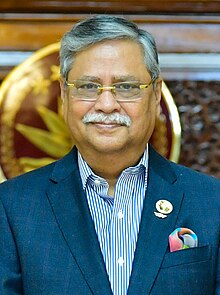
Back Presidente de Bangladex AST বাংলাদেশের রাষ্ট্রপতি Bengali/Bangla President de Bangladesh Catalan Πρόεδρος του Μπανγκλαντές Greek Presidente de Bangladés Spanish رئیسجمهور بنگلادش Persian Bangladeshin presidentti Finnish Président de la république populaire du Bangladesh French Presidente de Bangladesh Galician बांग्लादेश के राष्ट्रपति Hindi
| President of the People's Republic of Bangladesh | |
|---|---|
| গণপ্রজাতন্ত্রী বাংলাদেশের রাষ্ট্রপতি | |
 Seal of the president of Bangladesh | |
 Standard of the president of Bangladesh | |
| Head of State of the People's Republic of Bangladesh Executive branch of the Government of Bangladesh | |
| Style |
|
| Status | Head of State |
| Residence | Bangabhaban |
| Appointer | Jatiya Sangsad |
| Term length | Five years, renewable once |
| Precursor | Governor of East Pakistan |
| Inaugural holder | Sheikh Mujibur Rahman |
| Formation | 17 April 1971 |
| Deputy | Vice President of Bangladesh (1971-1991) Speaker of the Jatiya Sangsad (1991-present) |
| Salary | ৳ 120,000 Monthly (US$ 1,410) ৳ 1,440,000 annually (US$ 16,925) |
| Website | www |
| This article is part of a series on the |
| Politics of the People's Republic of Bangladesh |
|---|
 |
|
|
|
|
The President of Bangladesh (Bengali: বাংলাদেশের রাষ্ট্রপতি — Bangladesher Raṣhṭrôpôti) officially the president of the People's Republic of Bangladesh (Bengali: গণপ্রজাতন্ত্রী বাংলাদেশের রাষ্ট্রপতি —Gaṇaprajātantrī Bangladesher Raṣhṭrôpôti) is the head of state of Bangladesh and commander-in-chief of the Bangladesh Armed Forces.
The role of the president has changed three times since Bangladesh achieved independence in 1971. Presidents had been given executive power. In 1991, with the restoration of a democratically elected government, Bangladesh adopted a parliamentary democracy based on a Westminster system. The President is now a largely ceremonial post elected by the Parliament.[1]
In 1996, Parliament passed new laws enhancing the president's executive authority, as laid down in the constitution, after the Parliament is dissolved. The president resides at the Bangabhaban, which is his office and residence. The president is elected by the 350 parliamentarians in an open ballot, and thus generally represents the majority party of the legislature.[2][3][4] He continues to hold office after his five-year term expires until a successor is elected to the presidency.[2]
Mohammed Shahabuddin is the current president, he was elected unopposed on 13 February 2023. He took office for a five-year term on Monday, 24 April 2023.
- ^ "Background Note: Bangladesh", US Department of State, May 2007
- ^ a b Cite error: The named reference
conswas invoked but never defined (see the help page). - ^ "Presidential Election Act, 1991". CommonLII. Archived from the original on 18 April 2012. Retrieved 3 December 2011.
- ^ Chowdhury, M. Jashim Ali (6 November 2010). "Reminiscence of a lost battle: Arguing for the revival of second schedule". The Daily Star. Archived from the original on 24 October 2012. Retrieved 3 December 2011.



